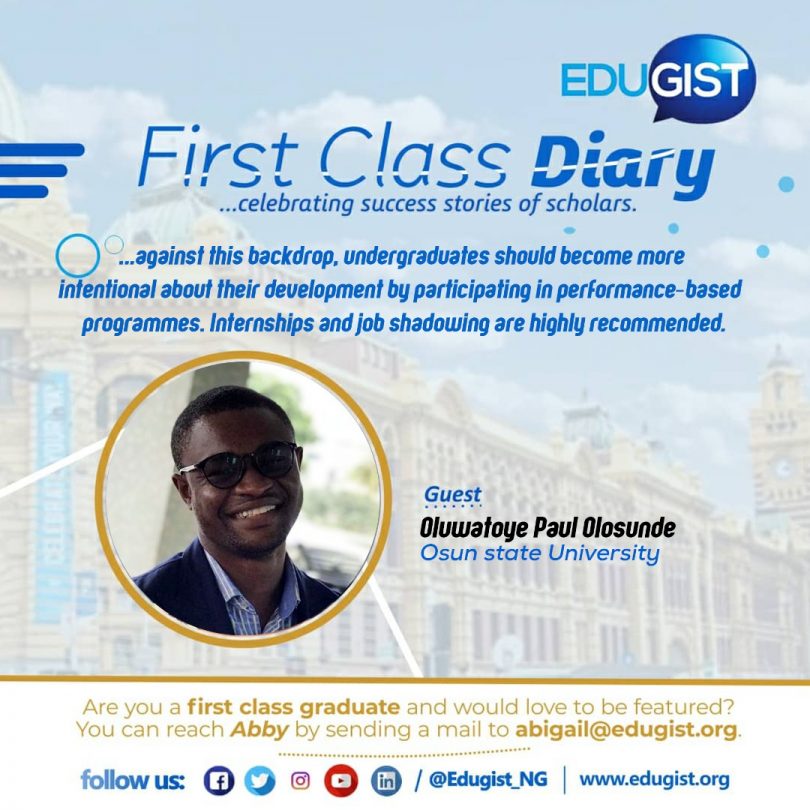Undergraduates Should Become More Intentional about their Development by Participating in Performance-Based Programmes
Hello readers, good morning to you and happy last day of the month! Smile. First, let me say to you, I am sorry for not posting last week. It was beyond my power.
So, this week, we have on the series, a young man all the way from osun state University. You read that right. Please meet, Oluwatoye Paul Olosunde, a Chartered Accountant.
In his words,
…against this backdrop, undergraduates should become more intentional about their development by participating in performance-based programmes. Internships and job shadowing are highly recommended.
Enjoy!
Abigael Ibikunle of Edugist: Please share with Edugist, a little about your background.
Oluwatoye Paul Olosunde: Oluwatoye Paul Olosunde is my name, an indigene of Ibadan in Oyo State. I was born in Lagos and had my early school education there. Before moving with my family to Ibadan, Oyo state where I completed my secondary education.
Thereafter, I proceeded to Osun State University, Osogbo, to pursue a BSc. degree in Accounting, graduating with a First Class Honours. In my second year as an undergraduate, I was a privileged recipient of the MTN Foundation Science and Technology Scholarship Award, among other awards, as an undergraduate.
Sequel to completing the mandatory one-year service to the nation, I joined one of the top Investment Banks in the country for a short stint. After which I moved to a Big Four Accounting firm where I currently consult as an Audit Analyst for various organizations. The likes of Public Interest Entities (PIEs) and Multinational Corporations (MNCs). In addition, I am a Chartered Accountant, while also an MBA and CFA Candidate.
I have a soft spot for research, op-eds, blogging, reading bestsellers, sightseeing tours, photography, volunteering and music.
AI: Was there any motivating factor(s) that influenced your choice of discipline and institution?
OPO: As a teen, I wanted to become a banker like my Dad and hero. I always admired his well-ironed suit and polished shoes as he made his way to work each morning.
In fact, I used to dream of becoming the Managing Director of the bank he worked with. The infamous financial distress that hit the banking sector in 2008, opened my mind to exploring my passion for related disciplines.
In one of our usual evening chit-chats, my Dad advised me to consider building a career in the field of Accounting because of its professionalism and wider marketability.
That discussion strengthened my focus on business subjects in secondary school. And I led the class, producing the best West African Examination result in my set.
My choice of Institution was also largely influenced by my father. He wanted a quality tertiary education for me in an Institution not so far from our Ibadan home. Osun State University, Osogbo returned as the best higher institution suited to our needs among the options we considered at the time.
AI: There are two major skills that every student must possess: COMPETENCE and PERFORMANCE. While competence revolves around skill acquisition, performance is much more concerned about skills application. It is believed that most graduates are competent because their academic performance testifies to this, but they are performance-challenged. This poor performance ipso facto hinders them from getting lucrative jobs in the labour market. What can you say about this assertion?
OPO: Leveraging on the benefit of hindsight, the assertion is relatively true. In the present-day highly competitive job market, there are numerous factors that affect competent graduates from securing lucrative jobs.
But, performance-related inefficiencies have contributed significantly. It is not uncommon to find a computer graduate who cannot fix a simple computer bug when required.
There are numerous Accounting graduates who cannot use popular off-the-shelf software like MS Excel for bookkeeping and journal entries effectively.
Many top graduates of statistics and data analysis have poor application command of Power BI and programming. Others cannot just turnout a job in time, without too many, significant errors. These graduates are fantastic on paper but fail to produce performances that match the results on their certificates when needed.
AI: What do you think is responsible for competence without performance? Please suggest ways of improving the performance level of university students and graduates.
OPO: Our education system is purely knowledge-centric, with little or no space for practice and application. For instance, overcoming the challenge of physical distancing and restricted gatherings precipitated by the COVID 19 contagion. Many organizations have embraced remote working systems and deployed online-based working modules.
On the contrast, many learning institutions are awaiting the reopening of traditional campuses for undergraduates to resume onsite learning.
The result of this gap would be graduates who have been certified worthy in learning but a misfit for the workspace – having not had practical experience of the ‘new normal’ in the job market.
Against this backdrop, undergraduates should become more intentional about their development by participating in performance-based programmes. Internships and job shadowing are highly recommended.
Further, Massive Open Online Courses (MOOCs) like Coursera, edX, Udacity and Udemy provide virtual learning opportunities for graduates. It would help graduates to hone their performances and increase their employability in the job market.
AI: Achievement in life transcends one’s personal efforts. There were people who, during your programme, rendered some assistance that made your dreams a reality. Who are specific persons whose contribution you can’t forget in your first-class feat?
OPO: I had the honour of being mentored by a model father until his demise shortly after my first year in the University. He would pull up at my hostel looking tired at late evenings after work just to check on my wellbeing.
My closest friends and roommates, Akinniyi Bukunmi (ACA), Falayo Busayo and Fayehun Emmanuel were a big bonus on the journey. Together we were regarded as the ‘Four Musketeers’ flying high in our respective departments.
We maintained a healthy rivalry and competitive studying habits while living together on campus.
I cannot forget the contributions of my Aunt, Aladesoun Bunmi especially in the third and fourth years when I needed someone to encourage me.
My lecturers, Olagunju Adebayo (PhD, FCA) and Adebayo Olalere (PhD, FCA) were a profound source of inspiration too, especially while writing my capstone project.
Finally, I cannot forget to document the timely intervention of the MTN Foundation. The organization, through its scholarship scheme, gave me a second chance at completing my degree programme when I was on the verge of dropping out following my sponsor’s demise.
AI: As a first-class graduate, are you currently gainfully employed?
OPO: Yes. I am currently an Audit Analyst with KPMG Nigeria.
AI: Do you think your grades have or is giving you any major advantage over other graduates with lesser grades?
OPO: Yes. My good grades have earned me respect, selective opportunities and attention.
In my opinion, good grades have qualified me for certain opportunities and positions which a lesser grade would perhaps not have.
Beyond, however, the strength of my character has been continually required to remain and grow in those positions the good grades afforded me.
AI: For students who aspire to graduate with outstanding grade like yours, what would you advise them?
OPO: As a fervent believer, I would admonish any aspiring highflyer to keep faith in their Creator who can make all things possible. Then, they should lead a hardworking and disciplined academic lifestyle.
AI: What would you advise the government to do to improve the standard of our education system?
OPO: In my recommendation, government should really fight the frightening menace of corruption in the country.
The merit of this recommendation is that it will curb brain drain and mass exodus of the nation’s brightest intellectuals who should work for the development of the education sector.
In addition, academic research especially in the areas of STEM should be encouraged by funding or subsidizing such efforts. This will increase the competitiveness within our education system which is necessary to spur growth and innovation.
AI: Any other thing you would like to share?
OPO: In conclusion, be reminded that glory never comes to the dreamer but the doer. You’re not inadequate to go for glory. However, your fears need to make way for faith. Then, the universe will adjust to work in your favour.
That’s it for this week’s episode. I hope you enjoyed the interview. Got a scholar you would love to be featured? Would you like to sponsor any of our scholars you find their stories inspiring?
To contact any of them for engagements, Please reach out to me
I am Abigael Ibikunle and celebrating excellence is a top priority for me. iTeach, iSpeak, iTrain, iFacilitate, iWrite, iInterview and iLoveYou all. Smile! See you next week!








